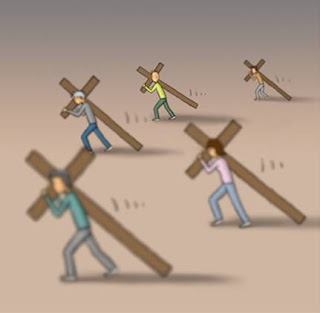"Now there was a man in Jerusalem called Simeon, who was righteous and devout. He was waiting for the consolation of Israel, and the Holy Spirit was upon him. It had been revealed to him by the Holy Spirit that he would not die before he had seen the Lord's Christ. Moved by the Spirit, he went into the temple courts. When the parents brought in the child Jesus to do for him what the custom of the Law required, Simeon took him in his arms and praised God, saying:"Sovereign Lord, as you have promised,
you now dismiss your servant in peace.
For my eyes have seen your salvation,
which you have prepared in the sight of all people,
a light for revelation to the Gentiles
and for glory to your people Israel."The child's father and mother marveled at what was said about him. Then Simeon blessed them and said to Mary, his mother: "This child is destined to cause the falling and rising of many in Israel, and to be a sign that will be spoken against, so that the thoughts of many hearts will be revealed. And a sword will pierce your own soul too."
There was also a prophetess, Anna, the daughter of Phanuel, of the tribe of Asher. She was very old; she had lived with her husband seven years after her marriage, and then was a widow until she was eighty-four. She never left the temple but worshiped night and day, fasting and praying. Coming up to them at that very moment, she gave thanks to God and spoke about the child to all who were looking forward to the redemption of Jerusalem." (Luke 2:15-38, NIV)
Two years ago, I was also waiting to see at Christmas time. After years of being very shortsighted, I finally scheduled a lasik procedure and was in the pre-operative time frame where I had to wear my heavy, thick glasses for a few weeks. Without my glasses, I could see nothing of the lights and colors of the season - just a massive blur around me. With my glasses, I could see, but I also felt the burden of that ability. My nose hurt and my ears ached from the weight of those "lightweight" lenses. But the excitement of knowing that was going to change gave me the patience to go through that season of waiting. It was going to be a thrilling moment when I could see without any help again.
Both Simeon and Anna had been waiting for a special moment, too. For years, they had felt the burden of their nation's sin and their nation's oppression. For years, they had hoped for the redeemer God had promised through the prophets. For years, they had watched and waited.
And they had to know it wouldn't be long now. Simeon had been told he would live to see the Christ and he knew he was closer to the end of his life than the beginning. Anna, living at the temple for many, many years, also waited for this momentous occasion.
How often do you suppose they scanned the crowds that went through the temple each day, wondering if this might be the day? The temple was a busy place, with animals, worshipers, priests and merchants all crowding around doing business. (Remind you of malls at this time of year?) How often do you suppose they searched the faces around them, waiting for that nudge that told them this was the one?
And then they saw. I am sure that they were among the few that did. But Anna recognized the child of this humble couple as the redemption of Jerusalem. Simeon, prompted by the Spirit, met him and praised God for him: "My eyes have seen your salvation." All their hopes were realized in one eight-day-old child visiting the temple because they recognized the One they had been looking for.
And, really, that sums up my prayer for you this Christmas. I pray that in all the hustle and bustle, the people and the noise, the business and the pleasure that you will see those moments of eternal significance; that you will see the child in the manger and recognize Him for who He is; that you will recognize the love that prompted such an amazing story. And that you, too, will say to God "My eyes have seen your salvation..."
Merry Christmas.



















vjcoulman.jpg)

